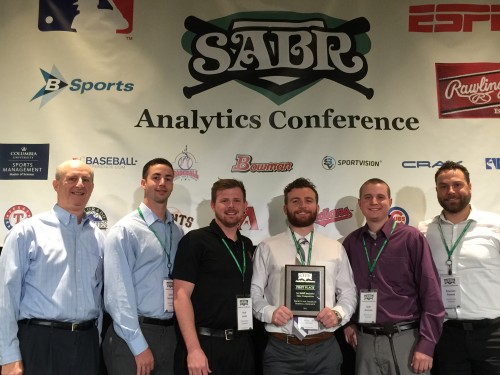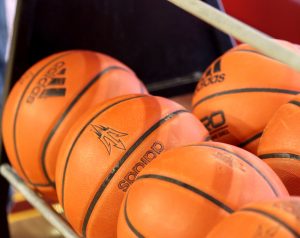Five long days in a cramped study room.
That’s what it took for five students from the Arizona State’s W.P. Carey School of Business to claim the top prize in the graduate school division at the Society of American Baseball Research Analytics Conference.
The team won the Diamond Dollars Case Competition, even though they were fighting through a shortened week because of final exams. The ASU group evaluated the potential worth of Major League pitcher Cole Hamels, using a focus on analytical formulas, nicknamed analytics, and strategies similar to those that major league franchises rely on.
One thing was clear walking away from the podium with the grand prize: baseball means business.
“That’s one of the biggest misnomers about sports,” said Reid Smith, a member of the five-member team. “Whether it’s on the field or on the business side of things, it’s business. Just because it’s sports doesn’t make it different. Anything you do in regular business, whether that’s forecast sales or manage inventory, you do in a baseball context and in the sports world. I don’t think people always connect those dots.”
Baseball and other sports are now so heavily ingrained with statistics that they make perfect subjects for case studies, in which students are presented with a dilemma and asked to come up with a diagnosis. Cases are a common course tool in business schools, like Carey, and stress the same team dynamics as the SABR competition.
The ASU team included former high school players, and even a former minor leaguer. They used analytics to evaluate and project Hamels’ performance over his contract. In the end, they predicted Hamels’ future performance and created their own index to rate which teams stood to benefit most from bringing in Hamels.
But the big money isn’t the only side of business in baseball, the team members said. Knowing how well money is spent and the employee performance is imperative for any team, just as it is for any Fortune 500 company.
“Sports teams, not just baseball, are run as businesses, so you have to treat them like assets,” said team member Sean Aronson. “Our professors have taught us the business side of it, but we’ve been able to take that application and apply it to any valuation, forecast or anything like that.”
At the competition, the team presented to officials from the San Francisco Giants, Baltimore Orioles and Arizona Diamondbacks organizations, who praised the students’ methodology. But what was most reassuring for the team of business students was their ability to take what they’ve learned in the classroom and apply it to real life situations.
Even outside of business, the team said they thought such analytical evaluation was important to use when looking at any statistical field, especially in the sciences. Finding something like baseball to demonstrate a statistical and analytic approach is especially useful to help the public understand what the data means.
“I feel like whenever I tell someone how we’ve applied these concepts to this baseball question, everyone is really fascinated by it because baseball is really something everyone can relate to. Almost everyone’s played baseball at some point in their lives,” said ASU team member David Bocchino. “Not everyone understands or enjoys statistics, but everyone knows baseball.”
***
Learn how to cover money better on your beat. Register for one of our upcoming workshops.











